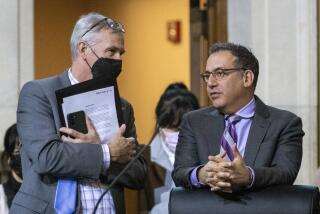Bell City Council Lowers Taxes, Fees for Struggling Poker Club
- Share via
BELL — Under pressure from new management at the California Bell Club, a reluctant City Council has voted to temporarily lower city taxes and waive fees for the struggling casino and to allow the Asian tile game of mah-jongg to be played there.
In a 4-0 vote with Mayor George Simmons absent, the council on Monday reduced the city’s share of the club’s monthly revenues to a flat 8% until March 1, 1986. The new rate replaces a sliding fee schedule that had brought the city 13% of the club’s revenues--and more than $8 million--from late 1980 to December, 1984. The measure was approved as an emergency ordinance amending the city’s poker ordinance and is effective immediately.
The temporary 8% rate will mean a loss of about $210,000 in anticipated city revenues from now until March, city officials said. The revenues from the club this fiscal year are expected to total no more than $800,000, city officials said.
Loss in Revenue
That reduction is on top of the loss to the city of $1 million out of $1.8 million in anticipated revenues for the fiscal year that ended in July, city officials said.
The reduction in revenues comes largely from a loss in customers at the club because of the previously poor management, said club spokesmen, and heavy competition.
In addition, the council also waived the club’s quarterly business license fees totaling $36,000 that would have been due in October, 1985, and January, 1986.
The council action comes while the city is suing the club for an estimated $286,000 in back poker taxes and fees owed from December, 1984, to July, 1985. The city is negotiating a payment plan with the club’s new management, City Administrator Byron Woosley said.
Monday’s concessions to the club did not come easily to the council, which already has put off $500,000 in maintenance expenditures, trimmed $200,000 from its administrative budget, and which must wring another $300,000 in cuts from a $10-million budget to erase the $1-million shortfall.
The concessions to the club could “send a clouded message to the business community,” encouraging any business with problems to seek help from the council, Councilman George Cole said.
Received Assurances
The council approved a set of rules for mah-jongg in a 3-1 vote after assurances from Bell-Cudahy Police Chief Frank Fording that the rules proposed for the game are legal under the state Penal Code. Under the city’s poker ordinance, rules for new games at the club must be approved by a majority of council members.
The club had sought permission to play the game in order to compete with other Southeast-area casinos that offer mah-jongg. Cole cast the sole vote against the rules for mah-jongg, because, he said, “I think we’ve got enough games going on right now.”
In addition to lo-ball, draw poker and panguingue (a card game played with eight decks with the eights, nines and tens removed), the club also offers pai gow , a popular Asian betting game played with domino-like tiles.
(Some law enforcement officials contend pai gow is illegal, and a decision is pending in the courts.)
In a separate action that will increase club payments to the city, the council required the club to pay $3,900 monthly, as part of the city’s contributions to city employee pensions. That payment will continue through March, 1986. The council considered but rejected a .01% increase in property taxes that would have added about $10 to each taxpayer’s yearly bill to pay the pension costs, which cannot be put off. City officials, who had extensively trimmed the city budget, chose not to find another source in the budget for the money.
“Everybody’s got to share in the misery,” Councilman Ray Johnson said. “The card club’s got problems. We’ve got problems.”
Atmosphere ‘Changed’
Sam Torosian, new general manager at the club and head of an investors’ group that is attempting to purchase the club, told the council that he has “completely changed the atmosphere” there.
“When I walked through the doors (in March), there were eight tables on the floor with patrons,” Torosian said. “It had a pretty bad environment at the time.”
On a recent afternoon, 45 tables out of a total 54 were operating now, Torosian said in an interview. Mah-jongg is not expected to bring the club significant revenue, but will attract the wives of men who come to the club to play pai gow , Torosian said.
“It creates more of a family atmosphere,” he said.
Torosian, who says he is “not a (card) gambler,” would not comment on whether the club would ask for a continuance of the city’s concessions next March.
“We can leave the door open,” he told the council.
Receipts Increased
The club’s gross receipts have increased from $500,000 in March to $730,000 in July, Torosian said in an interview. But the club needs at least $810,000 per month to break even--without taking into account a debt between $400,000 and $800,000 and the cost of several lawsuits pending against the club, said Leslie Garber, club lawyer. (At its peak in July, 1984, the club’s gross receipts reached $1.5 million.)
“We have a long way to go in terms of a break-even point,” Garber told the council.
Torosian said that he had “poured several hundred thousand dollars into the club to keep it going,” and was sure of success “as long as we have cooperation by the City Council.”
“They have to realize that something out of the club is better than nothing,” Torosian said.
More to Read
Sign up for Essential California
The most important California stories and recommendations in your inbox every morning.
You may occasionally receive promotional content from the Los Angeles Times.










